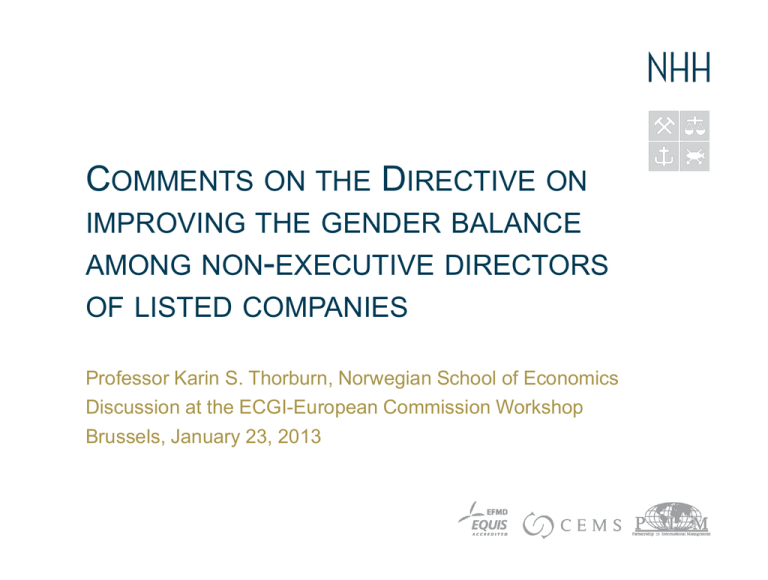
COMMENTS ON THE DIRECTIVE ON
IMPROVING THE GENDER BALANCE
AMONG NON-EXECUTIVE DIRECTORS
OF LISTED COMPANIES
Professor Karin S. Thorburn, Norwegian School of Economics
Discussion at the ECGI-European Commission Workshop
Brussels, January 23, 2013
2
3
.
0
1
.
2
0
1
3
The directive in brief
• Each gender should hold at least 40% of the non-executive
director positions of listed firms
• Firms failing to meet the 40% requirement should select
directors
- Based on an objective, comparative analysis of the qualifications of
each candidate
- Using pre-established, clear, neutrally formulated and unambiguous
criteria
- If equally qualified, priority should be given to the underrepresented sex
• An unsuccessful candidate may require disclosure of the criteria,
comparative assessment, and consideration tilting the decision
• Firms should provide information about the gender representation
on their boards and intended actions yearly
2
2
3
.
0
1
.
2
0
1
3
Key questions
• Are gender balanced boards a way to improve corporate
performance or simply a gender equality issue?
-
The role of the board
Evidence on women on boards
The Norwegian board gender quota
Quotas in politics
• Is regulatory action necessary to obtain gender-balanced
boards?
- Will the board gender-balance change without regulation?
• Will the directive succeed in changing the gender-balance on
boards of listed firms in Europe?
- Is “comply or explain” enough to enforce change?
3
2
3
.
0
1
.
2
0
1
3
Board room gender quotas in Europe, 2012
Country
Year
passed
Quota
size
Year of
compliance
Sanctions
% female
directors
Norway
2003
40%
2008
yes
42%
Spain
2007
40%
2015
no
11%
Iceland
2010
40%
2013
yes
25%
France
2011
40%
2017
yes
22%
Belgium
2011
33%
2019
yes
11%
Netherlands
2011
30%
2016
no
19%
Italy
2011
33%
2015
yes
6%
European Union
Legislative proposal: 40% gender quota
14%
4
2
3
.
0
1
.
2
0
1
3
The role of the board of directors
• Monitoring vs. giving advice
• Outside vs. inside directors
- More independent, but less informed about the firm
• CEO turnover is more sensitive to firm performance when
-
The board is dominated by outside directors (vs. insiders)
The board is relatively small
Directors have equity incentives
The CEO is not Chairman of the board
• Board characteristics and firm performance
- Near impossible to attribute causality
• Do certain firms chose certain boards?
• Or do board characteristics affect firm performance?
5
2
3
.
0
1
.
2
0
1
3
Female directors and firm performance
• Several studies find a positive relationship between fraction
female directors or top executives and firm performance
- Stock returns, ROE, ROA, ROIC, sales growth, etc.
• But it is impossible to make any inferences about causality
- Are profitable firms more likely to appoint women?
- Or do women prefer directorships in profitable firms?
• Similar issue with studies that find a correlation between
gender diversity and CSR, CER, or better management
practices
• Little ground for claims that adding women to the board will
improve firm performance
6
2
3
.
0
1
.
2
0
1
3
Valuation effect of female directors
(Adams, Gray and Nowland, 2011)
• Shareholders seem to value voluntary appointments of female
directors more than appointments of male directors
- Study of mandatory announcements of new outside director
appointments in Australia, 2004-2006
- Stock price reaction significantly higher on the announcement of female
directors (approx. 2%), controlling for director characteristics
- Similar results exist for firms in Spain and Singapore
• Firms that appoint female directors have bigger and more
diverse boards, and more equal opportunity practices
7
2
3
.
0
1
.
2
0
1
3
Are female directors better monitors?
(Adams and Ferreira, 2009)
• Gender-diverse US boards allocate more effort to monitoring
- Female directors have better attendance records
- Male directors have better attendance in gender diverse boards
- Female directors are more likely to join monitoring committees
• Audit, nominating, corporate governance
• The monitoring of gender-diverse boards is manifested in
higher performance-sensitivity of CEO turnover
- And a higher likelihood of equity-based board compensation
• Gender diversity increases firm value in firms with weak
shareholder rights (where monitoring is valuable)
• But it reduces the value of firms with strong shareholder
rights
- Could there be too much monitoring?
8
2
3
.
0
1
.
2
0
1
3
Gender spillover from the board to top
management (Matsa and Miller, 2012)
• Female representation on corporate boards seem to affect the
gender composition of the top management
• Firms with more women directors on the board have more
female top executives
- The previous year’s female share of directors predicts the fraction
females in top management, but not the reverse
- Changes in board composition precede changes in executive
membership
• Could reflect different preferences of the board
• Or a corporate culture that attracts female top executives
9
2
3
.
0
1
.
2
0
1
3
History of Norwegian quota and stock market
reaction (Eckbo, Nygaard and Thorburn, 2012)
%
women
Average
return
Cumul.
return
1999-10-15 Public hearing: 25% board quota
3%
-0.48%***
-0.48%***
2001-07-02 Public hearing: 40% board quota
4%
-0.03%
-0.51%***
Date
Event
2002-02-22
News interview: minister supports
quota
5%
-0.78%***
-1.29%***
2002-03-08
Government asks private sector to
add women voluntarily
5%
0.64%***
-0.65%*
7%
-0.33%**
-0.98%**
2003-06-13 Law proposal presented
2003-11-27
Law passed. Voluntary compliance
by 2005 will void the law
7%
0.48%***
-0.50%
2005-12-09
Law is mandated with forced
liquidation as sanction
15%
0.25%*
-0.25%
10
2
3
.
0
1
.
2
0
1
3
Board characteristics of Norwegian firms
(Ahern and Dittmar, 2012)
2002
2006
2009
Number of directors
5.5
5.6
5.3
Female (%)
7%
29%
43%
CEO experience (%)
65%
59%
58%
Higher education (%)
26%
28%
29%
Age (years)
51
51
52
Tenure (years)
3.0
2.3
2.6
Norwegian (%)
93%
92%
90%
1.4
2.3
1.9
Board or CEO positions per person
11
2
3
.
0
1
.
2
0
1
3
Director characteristics of Norwegian firms
(Ahern and Dittmar, 2012)
Female
Male
New
Exiting
New
Exiting
46
48
50
53
CEO experience
31%
36%
64%
65%
University degree
33%
30%
19%
23%
CEO
16%
20%
28%
26%
CFO
7%
9%
5%
3%
VP
13%
14%
7%
5%
Non-executive manager
15%
14%
5%
5%
Consultant
14%
9%
10%
10%
Age
Primary outside occupation:
12
2
3
.
0
1
.
2
0
1
3
Do outside CEO directors add value?
(Fahlenbrach, Low, and Stulz, 2010)
• Positive stock-price reaction when the first CEO outside
director is appointed (vs. other outside directors)
- But not for additional CEO-director appointments
• The appointment of a CEO outside director is not followed by
improved operating performance
- No increase in performance-sensitivity of CEO turnover
- No improvement of acquisition announcement returns
- No change in CEO compensation policies
• Performance drops when the CEO-director is interlocked
- Interlocks reduce CEO turnover for well-performing firms, suggesting
that “life is good”
13
2
3
.
0
1
.
2
0
1
3
Are female directors “busy” directors
• Total number of board memberships for directors of Norwegian
listed firms, July 2012
% of female
directors
% of male
directors
One board role
83%
89%
Two-three board positions
15%
10%
Four or more board positions
2%
1%
Number of directorships
• Female directors are often “independent” directors
- 84% vs. 50% of male directors
14
2
3
.
0
1
.
2
0
1
3
The board reform and corporate decisions
(Matsa and Miller, 2011)
• Study comparing Norwegian quota firms to similar firms in
Scandinavia or private firms not subject to the quota
• The quota firms failed to reduce the work force relative to
comparable firms after the quota (2003-2006 vs. 2006-2009)
- Quota firms undertook fewer workforce reductions
- Relative increase in employment levels and labor costs
- Relative decline in operating profitability (ROE)
• Strongest effects for boards adding the most women
• Greater effect on corporate strategy for boards appointing a
new CEO after the quota
- After quota, 5% of CEOs were female (vs. 0% before quota)
• Are female directors are more altruistic?
15
2
3
.
0
1
.
2
0
1
3
Female directors seem more stakeholder
oriented (Adams and Funk, 2011)
• Survey of all directors of publicly listed firms in Sweden in
2005
- Established survey (Schwartz PVQ)
- Shown to successfully predict economic behavior
• Female directors report significantly different core values than
their male colleagues
- Care less for power and achievement
- Are more benevolent and universally concerned
- Are more independent minded
• Value independence, stimulation and change more
• Value tradition, conformity and security less
- Are slightly more risk-loving (!)
16
2
3
.
0
1
.
2
0
1
3
Valuation effects of the Norwegian quota
• Ahern and Dittmar (2012) finds that market-to-book ratios
dropped over time for firms that had to add more female
directors
- However, controlling for director characteristics such as age and CEO
experience, this difference disappears
• Many non-listed firms changed legal form (Bohren and
Staubo, 2012)
- In particular, small, young, profitable firms with concentrated ownership
and few (if any) women on the board
- Was this because the quota destroyed value?
- Or was it initiated by male dominated boards avoiding change?
• Overall, difficult to conclude that the reform had any long-term
valuation effects
17
2
3
.
0
1
.
2
0
1
3
Gender quotas in politics
• Increases female representation in political bodies
- This increase lasts over time
• Help change attitudes and break down negative stereotypes
- Lasting effect after termination of quota
• Leads to different policy outcomes
- Increased investments in goods favored by women, such as drinking
water and other public goods
- Less political corruption and bribes
• Improves the quality of the politicians
- Increase in average level of education
- Increase in average IQ of male politicians
18
2
3
.
0
1
.
2
0
1
3
Should board gender quotas be imposed?
• Inconclusive evidence as to whether adding women to the
board really increases firm value
• This makes a board gender quota a purely political issue and
a gender equality issue
- In Norway, the quota was proposed by the Ministry for Children, Family
and Equality
• Do we want a society where women has equal influence and
economic power as men?
- In the UK, a golf club membership is a 4 times better predictor of
receiving a corporate board position than a top university education
- So far, little change without legal action
- In my mind, there is only one answer to that question
19







